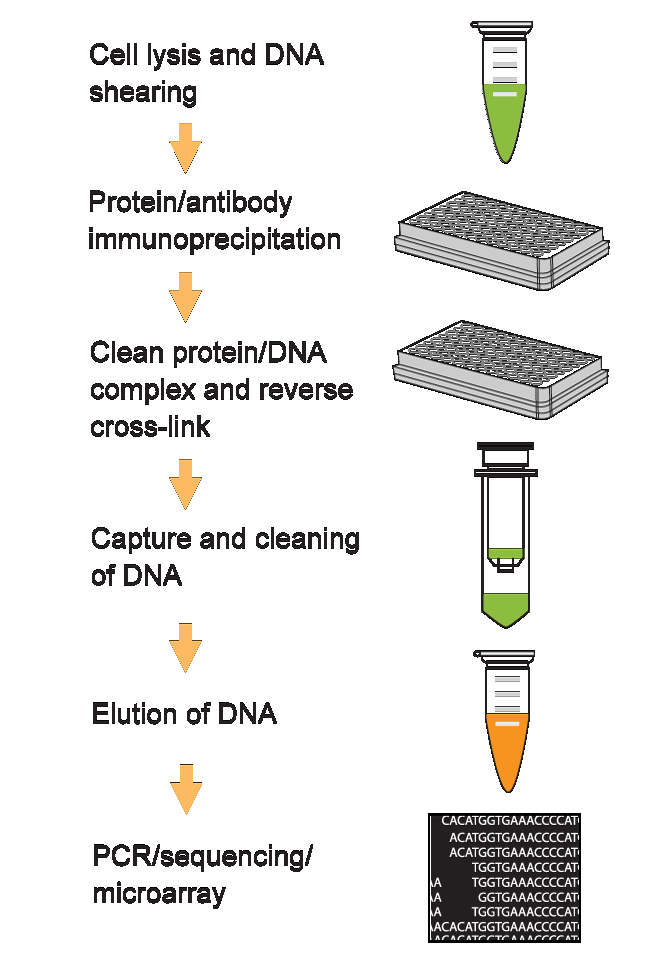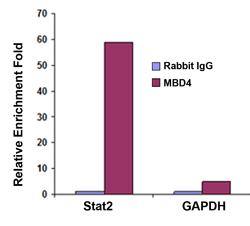EpiQuik Chromatin Immunoprecipitation Kit
For immunoprecipitating chromatin specifically from cell input samples via microplate format
Product Description
The EpiQuik™ Chromatin Immunoprecipitation (ChIP) Kit is a complete set of optimized reagents to perform chromatin immunoprecipitation (ChIP) via a convenient, microplate-based format. The kit is ready-to-use and provides all the essential components needed to carry out a successful ChIP experiment. The EpiQuik™ ChIP kits are suitable for combining the specificity of immunoprecipitation with qualitative and quantitative PCR, ChIP-Seq, and ChIP-on-chip. This kit has the following advantages:
- Fast and easy microplate-based procedure, that can be completed within 5 hours.
- Strip microwell format makes the assay flexible: manual or high throughput.
- Columns for DNA purification are included: save tremendous amounts of time and reduce unnecessary physical labor.
- Compatible with all DNA amplification-based approaches.
- Achieves very reliable and consistent assay conditions.
See also a quick chart to compare ChIP kits.
Background Information
Protein-DNA interaction plays a critical role in cellular functions such as signal transduction, gene transcription, chromosome segregation, DNA replication and recombination, and epigenetic silencing. Identifying the genetic targets of DNA binding proteins and knowing the mechanisms of protein-DNA interaction is important for understanding the cellular process. Chromatin Immunoprecipitation (ChIP) offers an advantageous tool for studying protein-DNA interactions. Unlike other methods such as EMASA, DNA microarrays, and report gene assays which analyze direct interactions between protein and DNA in vitro- ChIP can detect that a specific protein binds to the specific sequences of a gene in living cells.
Principle & Procedure

This ChIP kit includes a positive control antibody (RNA polymerase II), a negative control normal mouse IgG, and GAPDH primers that can be used as a positive control to demonstrate the efficacy of the kit reagents and protocol. RNA polymerase II is considered to be enriched in the GAPDH gene promoter that is expected to be undergoing transcription in most growing mammalian cells and can be immunoprecipitated by RNA polymerase II but not by normal mouse IgG. In this ChIP, cells are cross-linked with formaldehyde and chromatin is extracted. The chromatin is then sheared and added into the microwell immobilized with affinity antibodies. Cross-linked DNA is released from antibody-captured protein-DNA complex, reversed and purified through the specifically designed F-Spin Column. Eluted DNA can be used for various downstream applications.
Starting Materials
Starting materials can include various cell samples. In general, the input amount should be from 500,000 to 2,000,000 cells for each reaction.
Performance Data

Fig.2. ChIP was performed according to the protocol of the EpiQuik™ Chromatin Immunoprecipitation (ChIP) Kit using U2OS cells (1 x 106/well).
Product Citations
- Bi R, Hu R, Jiang L, Wen B, Jiang Z, Liu H, Mei J (2024) Butyrate enhances erastin-induced ferroptosis of lung cancer cells via modulating the ATF3/SLC7A11 pathway. Environ Toxicol
- Feng P, Pang P, Sun Z, Xie Z, Chen T, Wang S, Cao Q, Mi R, Zeng C, Lu Y, Yu W, Shen H, Wu Y (2024) Enhancer-mediated FOXO3 expression promotes MSC adipogenic differentiation by activating autophagy. Biochim Biophys Acta Mol Basis Dis
- Fu XL, Guo SM, Ma JQ, Ma FY, Wang X, Tang YX, Li Y, Zhang WY, Ye LH (2024) HBXIP induces PARP1 via WTAP-mediated m(6)A modification and CEBPA-activated transcription in cisplatin resistance to hepatoma. Acta Pharmacol Sin
- He S, Gao J, Li B, Luo Z, Liu P, Xu X, Wu M, Yang J, He X, Wang Z (2024) NtWIN1 regulates the biosynthesis of scopoletin and chlorogenic acid by targeting NtF6'H1 and NtCCoAMT genes in Nicotiana tabacum. Plant Physiol Biochem
- He S, Gao J, Li B, Luo Z, Liu P, Xu X, Wu M, Yang J, He X, Wang Z (2024) NtWIN1 regulates the biosynthesis of scopoletin and chlorogenic acid by targeting NtF6'H1 and NtCCoAMT genes in Nicotiana tabacum. Plant Physiol Biochem
- Catalog Number
P-2002-2-EP - Supplier
EpigenTek - Size
- Shipping
Blue Ice

